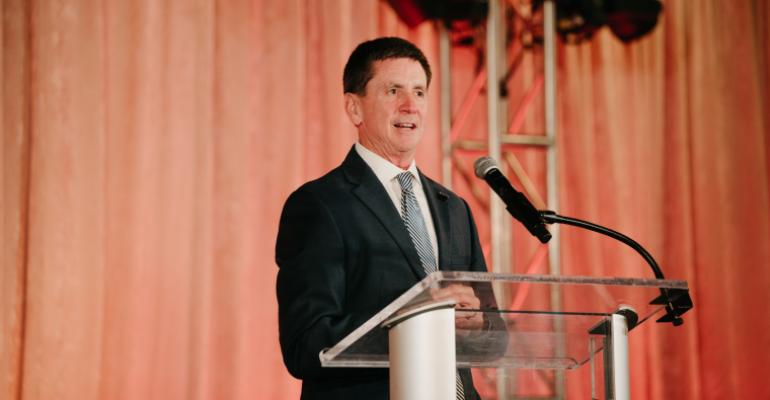Sitting down for a conversation with Steve O’Malley, two things are easily apparent: He’s accumulated a wealth of business-event experience, and he’s fully engaged with the industry and his role as COO at Maritz. Meeting Professionals International honored him with its Industry Leader Award at the recent World Education Conference in Louisville, and MeetingsNet had a chance to talk with him on site about a variety of industry issues.
On managing late bookings: A Maritz study released in April revealed that 45 percent of conference attendees in 2023 delayed registering until four weeks or less before an event. With typical room-block cutoff dates set at 30 days, O’Malley said work is needed to find solutions to this industry pain point.
“The reality is we know that our people are coming; we know that our blocks are going to fill or be very close to filling. So, how can we change the behavior of the ownership and the revenue managers of hotels to keep that window open for us, rather than having a fire sale through an OTA? Working with some of our strategic partners, we have tried to figure out a technology solution so that we can keep the group code active on reservations that are coming in through a different channel, and not necessarily just through an open-housing channel. This is a way that we can keep the integrity of the group's actual pickup.”
On workforce development: Half of the 700 meeting-planner attendees at MPI’s WEC were first-timers to the conference, a statistic that reflects the fact that many event planners left the industry during the pandemic, driving a wave of less-experienced planners into the field. O’Malley, who noted that as many as 50 percent of Maritz’s business-events staff are new over the past three years, commented on the fast pace of workforce development:
“Everybody's been forced to learn so quickly coming out of what we've gone through that ‘new’ is an odd term now. If you've been around for 12 or 18 months, you've seen a lot—as much as you would have over five years pre-pandemic. Things have just changed so dramatically, and everybody has had to learn multiple roles up and downstream. … We've been very fortunate to maintain our culture [at Maritz]. We're doing more training, more intensively, than we've ever done in the past because we have so many new people, and we're accommodating people with very diverse backgrounds, which is a wonderful addition to our culture.”
On airlines: Commenting on the lingering effects of the pandemic on the business-events industry, O’Malley pointed to the current airline industry landscape:
“Because business travel has not recovered fully, the airline industry has not grown its capacity and that affects the events industry. Until that gets back to a level of full consumption, it makes things brittle for our events. There's just less lift, so any scheduled change, any weather-related issue, any equipment failure makes it much more difficult to get our people where they need to be.
“Airline prices are still so high for many destinations because capacity has not been increased. Good for the airlines to run disciplined businesses, but it's affecting us by eating up so much of the event budget. It means we have to make decisions around what elements we can still design for, but maybe de-content a little bit, and still provide a great experience and achieve objectives.”
On client uncertainty: In addition to specific business-event challenges such as staff development, air lift, and late registrations, O’Malley sees clients’ uneasiness about investing in face-to-face meetings.
“As much as it feels like the economy is humming along in United States in particular, but also in Europe, there are headlines every week about massive layoffs from some company. We're seeing uncertainty four months, six months, 12 months out, with organizations wondering if they should hold an event or not.
“And I think it's bigger than what we've seen in the past. We work a lot with technology and automotive companies. The technology companies are taking investment from many places and putting it into A.I. Automotive companies are taking investment from many places and putting it into electrification. So, I think that's causing constraints relative to the events that they've traditionally invested in. We're monitoring that very closely to see where that’s going in the back half of this year and out into ‘25.”





